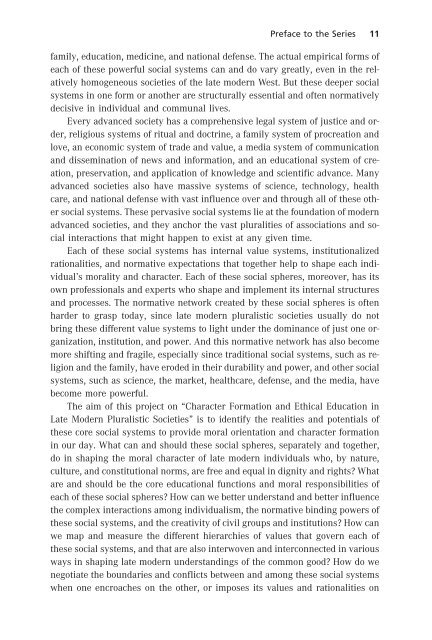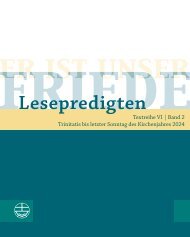Michael Welker | Eva Winkler | John Witte, Jr. | Stephen Pickard (Eds.): The Impact of Health Care (Leseprobe)
Pluralism has become the defining characteristic of many modern societies. Not only a plurality of individual and social claims and activities gain impacts on societal life. A creative pluralism of institutions and their norms profoundly shape our moral commitments and character – notably the family, the market, the media, and systems of law, religion, politics, research, education, health care, and defense. In the theoretical, empirical, and historical contributions to this volume, specialists on medicine, medical ethics, psychology, theology and health care discuss the many challenges that major transformations in their areas of expertise pose to the communication and orientation in late modern pluralistic societies. Contributors come from Germany, the USA and Australia.
Pluralism has become the defining characteristic of many modern societies. Not only a plurality of individual and social claims and activities gain impacts on societal life. A creative pluralism of institutions and their norms profoundly shape our moral commitments and character – notably the family, the market, the media, and systems of law, religion, politics, research, education, health care, and defense.
In the theoretical, empirical, and historical contributions to this volume, specialists on medicine, medical ethics, psychology, theology and health care discuss the many challenges that major transformations in their areas of expertise pose to the communication and orientation in late modern pluralistic societies. Contributors come from Germany, the USA and Australia.
You also want an ePaper? Increase the reach of your titles
YUMPU automatically turns print PDFs into web optimized ePapers that Google loves.
Preface to the Series 11<br />
family, education, medicine, and national defense. <strong>The</strong> actual empirical forms <strong>of</strong><br />
each <strong>of</strong> these powerful social systems can and do vary greatly, even in the relatively<br />
homogeneous societies <strong>of</strong> the late modern West. But these deeper social<br />
systems in one form or another are structurally essential and <strong>of</strong>ten normatively<br />
decisive in individual and communal lives.<br />
Every advanced society has acomprehensive legal system <strong>of</strong> justice and order,<br />
religious systems <strong>of</strong> ritual and doctrine, afamily system <strong>of</strong> procreation and<br />
love, an economic system <strong>of</strong> trade and value, amedia system <strong>of</strong> communication<br />
and dissemination <strong>of</strong>news and information, and an educational system <strong>of</strong> creation,<br />
preservation, and application <strong>of</strong> knowledge and scientific advance. Many<br />
advanced societies also have massive systems <strong>of</strong> science, technology, health<br />
care, and national defense with vast influence over and through all <strong>of</strong> these other<br />
social systems. <strong>The</strong>se pervasive social systems lie at the foundation <strong>of</strong> modern<br />
advanced societies, and they anchor the vast pluralities <strong>of</strong> associations and social<br />
interactions that might happen to exist at any given time.<br />
Each <strong>of</strong> these social systems has internal value systems, institutionalized<br />
rationalities, and normative expectations that together help to shape each individual’s<br />
morality and character. Each <strong>of</strong> these social spheres, moreover, has its<br />
own pr<strong>of</strong>essionals and experts who shape and implement its internal structures<br />
and processes. <strong>The</strong> normative network created by these social spheres is <strong>of</strong>ten<br />
harder to grasp today, since late modern pluralistic societies usually do not<br />
bring these different value systems to light under the dominance <strong>of</strong> just one organization,<br />
institution, and power. And this normative network has also become<br />
more shifting and fragile, especially since traditional social systems, such as religion<br />
and the family, haveeroded in theirdurabilityand power, and other social<br />
systems, such as science, the market, healthcare, defense, and the media, have<br />
become more powerful.<br />
<strong>The</strong> aim <strong>of</strong> this project on “Character Formation and Ethical Education in<br />
Late Modern Pluralistic Societies” is to identify the realities and potentials <strong>of</strong><br />
these core social systems to provide moral orientation and character formation<br />
in our day. What can and should these social spheres, separately and together,<br />
do in shaping the moral character <strong>of</strong> late modern individuals who, by nature,<br />
culture, and constitutional norms, are free and equal in dignity and rights?What<br />
are and should be the core educational functions and moral responsibilities <strong>of</strong><br />
each <strong>of</strong> these social spheres?How can we better understand and better influence<br />
the complex interactions among individualism, the normative binding powers <strong>of</strong><br />
these socialsystems, and the creativity <strong>of</strong> civil groups and institutions?How can<br />
we map and measure the different hierarchies <strong>of</strong> values that govern each <strong>of</strong><br />
these social systems, and that are also interwoven and interconnected in various<br />
ways in shaping late modern understandings <strong>of</strong> the common good? How do we<br />
negotiate the boundaries and conflicts between and among these social systems<br />
when one encroaches on the other, or imposes its values and rationalities on
















